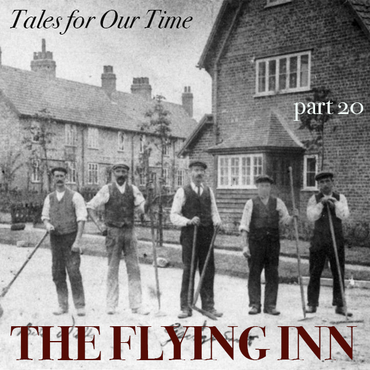Welcome to Part Twenty of The Flying Inn, G K Chesterton's highly prescient novel of 1914 and the the latest entry to our series Tales for Our Time.
In tonight's episode, our heroes find themselves in what's known as a "model village", created by the founder of Mountain Milk for the benefit of his employees:
Peaceways was in its essential plan much like what we call a Garden City; a ring of buildings where the work people did their work, with a pretty ornamental town in the centre, where they lived in the open country outside. This was no doubt much healthier than the factory system in the great towns and may have partly accounted for the serene expression of Dr. Meadows and his friends, if any part of the credit can be spared from the splendours of Mountain Milk. The place lay far from the common highways of England, and its inhabitants were enabled to enjoy their quiet skies and level woods almost undisturbed, and fully absorb whatever may be valuable in the Meadows method and view; until one day a small and very dirty motor drove into the middle of their town. It stopped beside one of those triangular islets of grass that are common at forked roads, and two men in goggles, one tall and the other short, got out and stood on the central space of grass, as if they were buffoons about to do tricks. As, indeed, they were.
The "model village" was a late Victorian/Edwardian fashion in which paternalist business magnates built not just factories but entire self-contained communities for their workers to live in. A few examples:
*Port Sunlight, on Merseyside, was set up by the first Viscount Leverhulme, founder of Lever Brothers, now Unilever, owners of Ben & Jerry's ice cream. If you watch the TV drama Peaky Blinders, quite a lot of it is filmed at Port Sunlight. If you like the Beatles, Ringo made his debut as the band's drummer there.
*Bournville, near Birmingham, was built by the Cadbury family, of chocolate-bar fame. It's regarded as one of "the nicest places to live" in England.
*New Earswick (top right) is probably closest geographically to the fictional Peaceways, being located in North Yorkshire. It was the work of Joseph Rowntree, a rival of the Cadburys whose company created, among many others, Aero, Kit Kat and the absolute favourite toffees of Saddam Hussein, George Galloway and me: Quality Street.
If you're a member of The Mark Steyn Club you can hear Part Twenty of our serialisation of The Flying Inn simply by clicking here and logging-in. All previous episodes can be found here.
~Membership in The Mark Steyn Club is not for everyone, but it helps keep all our content out there for everyone - in print, audio, video, around the world, and hopefully changing a mind or two here and there. And, aside from Tales for Our Time, being a Steyn Club member does come with a few other benefits:
~Exclusive Steyn Store member pricing on over forty books, CDs and other items in the Steyn store;
~The opportunity to engage in live Q&A sessions with yours truly, such as today's;
~Transcript and audio versions of our video content, such as Mark's Mailbox and The Mark Steyn Show;
~Comment Club privileges;
~Our Saturday music show and other weekend specials;
~Advance booking for my live appearances around the world, if I'm ever again well enough to hold any;
~Customised email alerts for new content in your areas of interest;
~and the opportunity to support our print, audio and video ventures as they wing their way around the world.
To become a member of The Mark Steyn Club, please click here - and don't forget our special Gift Membership.The minute you sign up you'll have access to over sixty Tales for Our Time, including my serialisations of Nineteen Eighty-Four, The Time Machine and The Strange Case of Dr Jekyll and Mr Hyde. And please join me tomorrow evening for Part Twenty-One of The Flying Inn.
























